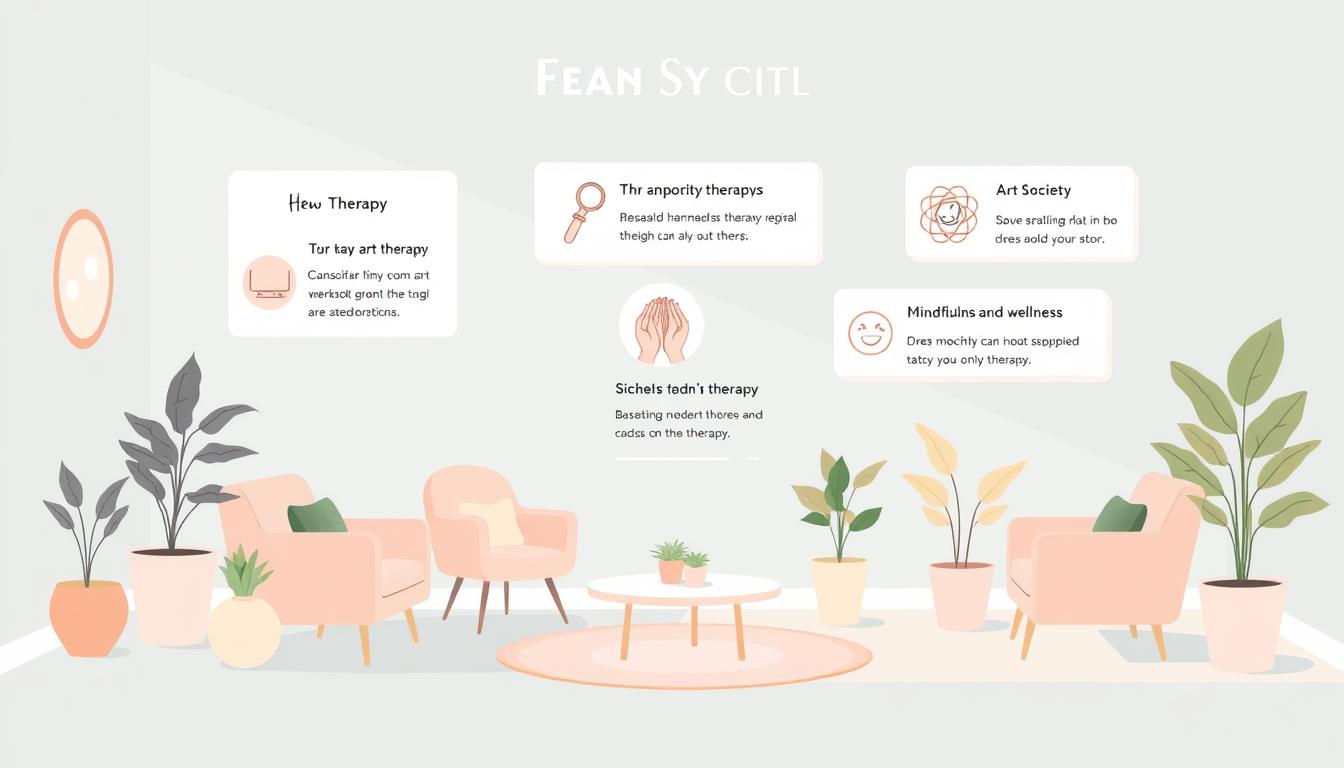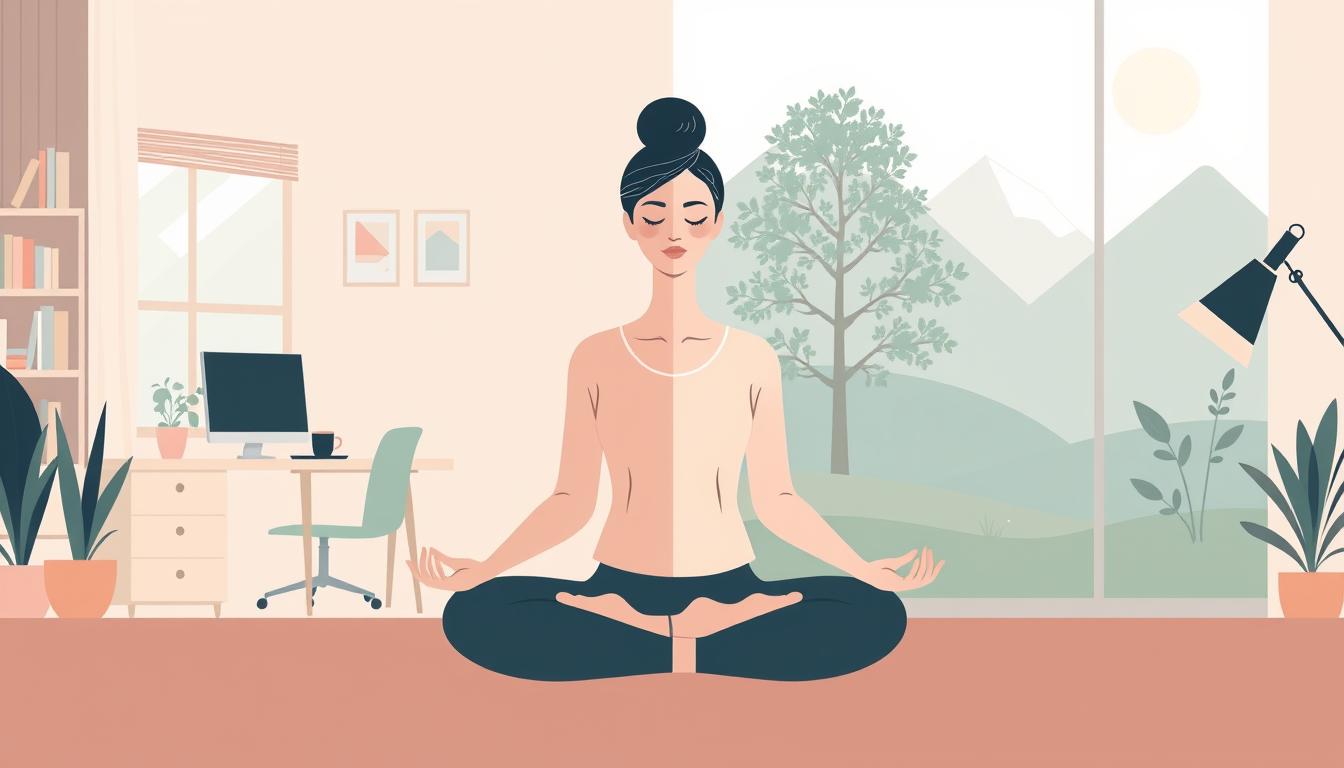Before 2020, over 20% of American women had depression or anxiety. This shows we need to focus on women’s mental health. We must find ways to help them feel better.
Improving mental health for women means taking care of themselves. This includes self-care, staying connected, exercising, being mindful, and getting help when needed. By using these tips, women can feel better and live a happier life.

Key Takeaways
- Mental health is crucial for overall well-being and functioning at every stage of life.
- Regular exercise, a healthy sleep routine, and balanced nutrition can significantly boost mood and mental resilience.
- Developing a support system, practicing mindfulness, and engaging in creative expression are effective ways to manage stress and improve mental health.
- Seeking professional help, such as therapy, can provide invaluable tools and resources for addressing mental health challenges.
- Incorporating self-care practices and maintaining a healthy work-life balance are essential for women’s long-term mental well-being.
Understanding the Importance of Women’s Mental Health

Women have special mental health challenges. This is because of their biology, society, and culture. Studies show women get depression, anxiety, and eating disorders more than men.
Women also deal with mental health issues like depression during pregnancy and before menopause. These are unique to them.
Common Mental Health Challenges Women Face
Women and men get some mental disorders at the same rate. But, women’s symptoms and how these disorders progress can differ. Scientists are studying how biology and society affect women’s mental health.
The Impact of Gender-Specific Factors
Many things can affect women’s mental health. Hormonal changes, societal expectations, and work-life balance are big ones. Physical and sexual abuse also play a role.
In Pakistan, helping pregnant women with anxiety helped a lot. It cut down anxiety and depression by over 70%.
Breaking Down Mental Health Stigma
It’s important to talk about mental health without shame. We need to make sure women know they can get help. By understanding women’s challenges, we can help them better.
Tips For Improving Mental Health In Women

Good mental health is key for women’s happiness. Women can make their lives better by trying different ways. Here are some tips to help:
- Practice self-care by doing things you love, like reading or taking baths.
- Reduce stress with mindfulness techniques like meditation or deep breathing.
- Build strong healthy relationships with loved ones and friends.
- Stay active with physical activity like walking or yoga.
Women can also get better by eating right and sleeping well. Getting help from therapists is important too. Plus, being positive helps a lot.
| Coping Mechanism | Benefits |
|---|---|
| Coffee Consumption | Lower rates of depression |
| Planning a Vacation | Boost in overall happiness for up to 8 weeks |
| Creative Expression | Improved overall well-being |
| Close Relationships | Key for a happy, healthy life |
| Dark Chocolate | Improved alertness and mental skills |
By using these tips, women can live a happier life. They can become stronger and feel better mentally.
Building Strong Support Systems and Social Connections

It’s very important to have strong social connections for your mental health. Humans do well when they have good relationships and feel part of a community. These connections can help fight loneliness, sadness, and anxiety, which are bad for your health.
Creating Meaningful Relationships
To make strong relationships, listen well, be empathetic, and support each other. Spend time with your loved ones by talking openly, sharing experiences, or just being there for them. This emotional connection makes you feel like you belong and are valued.
Finding Community Support Groups
Joining support groups is also great for your mental health. These groups are places where you can share, get advice, and feel less alone. Being part of these groups can make you feel supported and understood.
Maintaining Healthy Boundaries
It’s key to have strong connections but also to set healthy boundaries. Talk about what you need, set limits, and respect others’ boundaries. This keeps your mental health safe and prevents burnout. Make sure to check in with yourself and your loved ones to keep your relationships healthy.
The importance of social connections for women is huge. Having a strong support system for women’s mental health through healthy relationships greatly improves your well-being and strength.
“Having a strong support system can enhance mental health and well-being, reducing feelings of isolation and combating the negative effects of stress and anxiety.”
| Impact of Social Support | With Emotional Support | Without Emotional Support |
|---|---|---|
| Average Stress Level (Scale 1-10) | 5 | 6.3 |
| Risk of Physical and Mental Health Issues | Lower | Higher |
| Sense of Belonging and Emotional Connection | Higher | Lower |
The Power of Physical Activity and Exercise

Physical activity and exercise are key for women’s mental health. They boost mood and reduce stress. These activities are great for overall well-being.
Exercise benefits for women’s mental health are huge. People who are active often feel less stressed. Also, physical activity helps lower the risk of depression and dementia.
Exercise does more than just reduce stress. It releases happy chemicals like endorphins. This helps with depression and anxiety. It also helps distract from bad thoughts and boosts self-esteem.
To reduce stress, choose fun activities like dancing or Pilates. Try to do at least 30 minutes of moderate exercise daily. Being consistent helps improve both body and mind.
“Physical activity can be an alternative treatment for depression and anxiety. It releases ‘feel good’ chemicals like endorphins and serotonin, improving mood and aiding in the recovery process.”
Adding exercise to daily life is crucial for mental wellness. By focusing on physical activity and mental wellness, women can change their mental health for the better.
Mindfulness and Meditation Practices

Mindfulness and meditation help women feel better mentally. They focus on now and being kind to thoughts. This can lessen stress, anxiety, and sadness.
Daily Meditation Techniques
Just a few minutes of meditation each day can change a lot. Focused breathing, body scans, and guided imagery can calm your feelings. Research shows they can also cut down on anxiety and sadness.
Breathing Exercises for Stress Relief
Feeling stressed? Simple breathing can help right away. Deep breathing slows you down and relaxes you. Guided imagery lets you imagine calm places, which can also lower blood pressure and improve sleep.
Incorporating Mindfulness into Daily Routines
You can add mindfulness to your daily life easily. Mindful eating makes you enjoy your food more. Mindful walking keeps you in the moment. These small steps can make a big difference in how you feel.
“Mindfulness is not something you have to find – it’s something you already have.” – Jon Kabat-Zinn
Adding mindfulness techniques for women, meditation practices for mental health, and stress management for women to your day can bring peace and strength.
Nutrition and Its Impact on Mental Well-being

Good food is key for our minds. Eating fruits, veggies, whole grains, and lean proteins can make us feel better. Foods like fish, flaxseeds, and walnuts help fight depression.
It’s good to avoid junk food, sugar, and bad fats. Drinking water and eating regular, healthy meals keeps our mood steady. Eating right can make us feel happier and more energetic.
Healthy fats in avocados, nuts, and seeds are good for our brains. Whole foods like fruits and veggies give us important vitamins. Eating protein at every meal helps keep our mood stable.
Our gut health affects our mind. Eating foods like fruits, veggies, and probiotics helps our gut. This can make us feel happier and less stressed.
Too much caffeine can mess with our sleep and make us feel cranky. Eating with others is good for our minds. It helps us feel connected and happy.
| Nutrient | Impact on Mental Health |
|---|---|
| Omega-3 Fatty Acids (EPA and DHA) | Linked to decreased rates of depression and improved mood regulation |
| Magnesium | Helps alleviate stress and anxiety |
| Folate/Folic Acid | Plays a role in reducing pro-inflammatory cytokines and improving mental well-being |
| Vitamin E (alpha-tocopherol) | Contributes to maintaining mental health and well-being |
Eating right is important for our minds. Healthy eating, drinking water, and eating with others can help. These steps can make us feel better and more connected.
“Proper nutrition is not just about physical health, but also mental and emotional well-being. The right balance of nutrients can have a profound impact on mood, stress levels, and overall mental resilience.”
Sleep Hygiene and Mental Health

Good sleep is key for your mind. Bad sleep can make you feel grumpy, stressed, and even sad. Women can improve their mood and mental health by focusing on sleep.
Creating a Healthy Sleep Environment
Your bedroom should be cool, dark, and quiet for good sleep. The best temperature is between 60 and 67 degrees Fahrenheit. Choose comfy bedding and avoid screens before bed to help you sleep better.
Developing Consistent Sleep Patterns
Going to bed and waking up at the same time every day is important. It helps your body get into a sleep rhythm. Try not to nap too much during the day, as it can mess up your night sleep.
Managing Sleep Disruptions
Life can sometimes mess with your sleep. Try not to drink too much caffeine in the evening. Eat smaller meals before bed and relax with deep breathing or stretching. If you can’t sleep, get up and do something calm until you’re tired again.
| Sleep Hygiene Tip | Benefit for Mental Health |
|---|---|
| Maintaining a consistent sleep schedule | Regulates the body’s internal clock, promoting better sleep quality and reducing stress |
| Creating a cool, dark, and quiet sleep environment | Enhances relaxation, reducing anxiety and improving overall sleep experience |
| Limiting screen time and blue light exposure before bed | Supports the natural production of melatonin, the sleep-regulating hormone, and reduces cognitive stimulation |
| Engaging in relaxation techniques, such as deep breathing or light stretching | Helps manage stress and promote a calm mindset for better sleep |
Follow these sleep hygiene tips for women to boost your importance of sleep for mental health. Good sleep habits and a comfy sleep space are crucial for managing sleep for better mental well-being.
Creative Expression and Emotional Release

Creative outlets help us express feelings and improve our mental health. Things like painting, writing, dancing, or crafting can ease stress. Journaling is great for tracking what we’re thankful for and our wins.
Writing about tough times can also lessen depression symptoms. Creative activities make us feel better about ourselves and give us a sense of pride. Studies show they can even make us happier by raising dopamine levels.
Noémi Beres, a talented Hungarian artist, talks about how art helped her deal with loss and stress. She uses old photos, postcards, and other materials to make her art. Her work shows how art can heal our minds.
Encouraging creative outlets for emotional expression is good for kids and teens. It helps them feel strong and share their feelings. For older folks, art therapy for mental health can fight loneliness and keep their minds sharp.
Being fully present in creative activities makes them even more helpful. Online places like Instagram and Pinterest are great for sharing and getting support for our art.
In the end, the benefits of journaling for women and other creative ways are huge. They help us release emotions and feel better mentally.
Professional Support and Therapy Options

Getting help for your mental health can really change things. There are many therapy options for women. You can try cognitive-behavioral therapy, psychodynamic therapy, or group sessions. Each one is designed to meet different needs and preferences.
Types of Therapy Available
- Cognitive-Behavioral Therapy (CBT): Helps change negative thoughts and behaviors to feel better.
- Psychodynamic Therapy: Looks at past experiences and hidden feelings to understand mental health issues.
- Group Therapy: Offers a place to share, learn, and feel connected with others.
When to Seek Professional Help
Get help when mental health problems start to affect your daily life. Look for signs like feeling sad, anxious, or hopeless. Also, watch for changes in sleep, appetite, and energy.
Finding the Right Mental Health Provider
Finding the right therapist is key. Look at their credentials, what they specialize in, and how they treat patients. It’s important to feel comfortable and have a good connection with them. Many now offer telehealth options for easier access.
| Therapy Option | Description | Importance of Seeking Help for Women |
|---|---|---|
| Cognitive-Behavioral Therapy (CBT) | Focuses on identifying and changing negative thought patterns and behaviors to improve mental well-being. | CBT can help women address gender-specific mental health challenges, such as body image issues, stress related to work-life balance, and the impact of societal expectations. |
| Psychodynamic Therapy | Explores the root causes of mental health challenges by delving into past experiences and subconscious motivations. | This approach can help women uncover and process deeply-rooted emotional and psychological patterns that may be influencing their current mental health. |
| Group Therapy | Provides a supportive environment where individuals can share experiences, learn from others, and build a sense of community. | Group therapy can be particularly beneficial for women, as it offers a space to connect with others facing similar challenges and receive peer support. |
“Seeking professional help is a sign of strength, not weakness. It takes courage to prioritize your mental health, and the benefits can be truly transformative.”
Self-Care Practices and Daily Routines

As women, taking care of ourselves is key for our mental health. Self-care means doing things that help us feel better and live better. Having a daily routine helps us stay on track and feel good.
Doing things we love is a big part of self-care. This could be taking a warm bath, reading, doing yoga, or playing a hobby. Adding these activities to our day helps us relax and feel refreshed.
Also, taking care of our body is important. Getting enough sleep and eating well are big parts of self-care. Sleeping 7 to 8 hours a night helps our mind stay healthy.
Exercising is another great way to care for ourselves. It makes us feel happy and helps with sadness and worry. Whether it’s walking, yoga, or dancing, moving our body is good for our mind.
Thinking about ourselves and being mindful is also important. Journaling, meditating, and being in nature help us know ourselves better. They help us understand what we need and how we act.
Putting self-care first and having a daily routine that supports our mind can make us happier and more productive. By caring for ourselves, we can handle stress better, feel less anxious and sad, and love ourselves more.
| Self-Care Practice | Benefits |
|---|---|
| Physical Activity | Releases endorphins to improve mood Reduces stress and anxiety Boosts energy and productivity |
| Mindfulness and Meditation | Enhances self-awareness and self-understanding Promotes emotional regulation and stress management Fosters a sense of calm and inner peace |
| Spending Time in Nature | Reduces feelings of fatigue and burnout Helps manage symptoms of depression and anxiety Promotes a sense of well-being and connection |
By adding these self-care practices to our daily routine, we can face life’s challenges as women. We can find happiness and well-being in our lives.
Managing Work-Life Balance

Keeping a good work-life balance is key for women’s mental health. More women are working, which means more stress. This stress can hurt their physical and emotional health.
Setting Boundaries at Work
Setting clear work boundaries is important. This means not checking emails at home, saying “no” to extra work, and asking for flexible hours. These steps help avoid burnout and make personal time relaxing.
Time Management Strategies
Good time management is crucial. Prioritize tasks, use tools to stay productive, and delegate when you can. Make a schedule that fits both work and personal life.
Stress Reduction Techniques
Using stress-reducing methods at work is vital. Take breaks, do desk exercises, or use mindfulness apps. Talk to your boss and coworkers about your needs.
Getting a good work-life balance takes time and kindness to yourself. Set boundaries, manage your time well, and take care of yourself. This way, you can handle work and personal life better.
| Work-Life Balance Challenges for Women | Strategies for Improvement |
|---|---|
| Juggling professional and household responsibilities | Establishing boundaries, delegating tasks, and involving family members in planning |
| Feeling overwhelmed by excessive work and social obligations | Prioritizing self-care activities, creating a structured but flexible schedule, and seeking support from colleagues and loved ones |
| Disruption of career progress due to motherhood | Communicating needs to employers, advocating for family-friendly policies, and finding ways to maintain professional development |
“Achieving work-life balance is not about getting it perfect. It’s about managing your multiple life roles as best you can with the resources you have.”
Practicing Gratitude and Positive Thinking

Being thankful and thinking positively can really help women’s mental health. Writing down three things you’re thankful for each day can change your view of life. It’s also good to turn negative thoughts into positive ones.
It’s great to celebrate small victories and your daily wins. This boosts your confidence and drive. Being optimistic means facing challenges with a positive attitude. A 2022 study showed that gratitude helps women at risk for depression feel better.
Gratitude can also help you sleep better, leading to better rest. It makes you more empathetic and strengthens your relationships. Plus, it lowers stress by focusing on the good and reducing the bad.
Using positive thinking techniques is key for being optimistic and mentally well. Anxiety and depression often come from negative thoughts. Studies show that being present makes people happier.
Gratitude can fight negative thoughts like worrying and dwelling on the past. But, it’s not about ignoring pain. It’s about adding to your coping strategies, not replacing them.
“Gratitude can increase happiness and wellbeing, life satisfaction, and overall health, while decreasing anxiety, depression, and anger.”
By practicing gratitude and positive thinking, women can improve their mental health and life quality. It’s a strong tool for cultivating optimism and a positive outlook.
Nature and Mental Wellness Connection
Let nature help make you feel better. Studies show that being outside can boost your mood and energy. Just a short walk in a park can make you feel more calm and happy.
Doing things outside like hiking or kayaking is great for your mind. Nature’s sights, sounds, and smells can lower stress and make you feel better. Being in the sun can also help you sleep better at night.
Adding nature to your daily life can really help your mental health. Try going for a short walk, having plants at home, or looking at nature pictures. Let nature help you feel happier and healthier.
FAQ
What are some common mental health challenges women face?
Women often deal with depression, anxiety, and eating disorders. They also face postpartum depression. These issues come from hormones, society, and work-life balance.
How can women break down the stigma surrounding mental health?
To fight stigma, women need education and open talks. It’s key to understand and tackle these issues with the right support and treatments.
What strategies can women use to improve their mental health?
Women can improve their mental health by caring for themselves. They should manage stress, have good relationships, and stay active. Mindfulness, eating right, and sleeping well also help. Getting help when needed is important too.
Why are strong social connections important for women’s mental health?
Good relationships help fight loneliness and anxiety. Women need a support network and to join groups. Healthy boundaries are also key for mental health.
How can physical activity benefit women’s mental health?
Exercise helps with depression and anxiety. Enjoyable activities like dancing or Pilates release happy hormones. They also help sleep better and feel better overall.
What are the benefits of mindfulness and meditation for women’s mental health?
Mindfulness and meditation reduce stress and depression. Daily practices like breathing exercises help. They help women stay present and positive.
How does proper nutrition impact women’s mental well-being?
Eating well improves mood and lowers anxiety. Foods like omega-3s help with depression. Staying hydrated and keeping blood sugar stable also helps mood and energy.
Why is quality sleep essential for women’s mental health?
Bad sleep makes women irritable and stressed. It increases depression risk. A good sleep environment and routine are vital for mental health.
How can creative expression benefit women’s mental health?
Creativity like painting or writing helps process emotions. It reduces stress and boosts self-esteem. Journaling is great for tracking good days and dealing with tough times.
When should women seek professional support for their mental health?
Women should seek help if mental health issues affect daily life. Therapy types like cognitive-behavioral therapy help. Finding a supportive mental health provider is crucial.
Why is self-care important for women’s mental health?
Self-care is vital for mental health. It includes enjoying activities and relaxation. A daily routine and prioritizing self-care improve mood and well-being.
How can women maintain a healthy work-life balance?
A good balance is key for mental health. Setting work boundaries and managing time well helps. Talking to employers about needs prevents burnout.
What are the benefits of cultivating gratitude and positive thinking for women’s mental health?
Gratitude and positivity greatly benefit mental health. Keeping a gratitude journal and focusing on the good helps. It boosts self-esteem and outlook.
How can spending time in nature benefit women’s mental well-being?
Nature is great for mental health. Outdoor activities like hiking reduce stress and improve mood. Even indoor plants or nature sounds help.